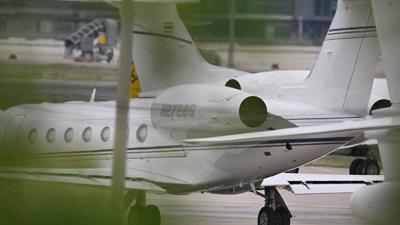![]()
Jet-shamed: How celebrity flight tracking became Hollywood’s new cancel culture
When you own a private jet and are part of the 1%, you can literally wake up one morning, decide you want to fly from LA to Paris in the afternoon, and actually do it. No security lines, no airport madness, and minimal possibility of a delayed flight. You’ll fly in the utmost comfort, land fully rested and ready to go on a shopping spree.
All of these sound amazing if you ignore the environmental costs of such actions. Ultra-rich individuals (celebrity or not) are often criticized for not taking responsibility for their contributions to climate-related consequences.
Since flight-tracking data is public record, people started calling out high flyers for their destructive habits. This is how public figures like Elon Musk, Mark Zuckerberg, Jeff Bezos, and Taylor Swift have come under public scrutiny for their habit of popping on their private jet even when the trip could’ve been a car ride. Jettly looks into the phenomenon here.
Is Jet-Shaming Cancel Culture?
The practice of tracking celebrities’ private jet habits began to grow around 2018, as people started analyzing the carbon footprint of the ultra-rich. The first one to get the world’s attention on this topic was Stefan Gössling, a Swedish professor who ran the @CelebJets Twitter account.
As public interest grew, he was joined by activist groups like Oxfam and journalists. Nowadays, the most notorious private jet tracker is Jack Sweeney, an American entrepreneur who started his public career by tracking Elon Musk’s flight habits. He also tracked celebrities like Taylor Swift, Kim Kardashian, and Kylie Jenner.
Of course, he and similar accounts have faced a lot of backlash from the ultra-rich. Elon Musk has blocked Sweeney’s X (formerly Twitter) account, Taylor Swift’s legal team has threatened to take action for what they consider stalking and harassment, and most recently, Mark Zuckerberg has also suspended his Meta accounts.
All this upheaval has led to new legislation that allows private jet owners to anonymize their registration information. This makes tracking harder, but not illegal.
More from this section
But let’s get back to the initial question: Is this cancel culture?
It depends. If it’s done solely for clout and aimed only at specific ultra-wealthy individuals, then it might be. However, when it focuses on the environmental factor, jet-shaming is a form of public pressure meant to raise awareness of this issue.
Unlike cancel culture, which often aims to ostracize individuals from public life, flight-shaming's primary goal is to influence behavior and promote more sustainable choices.
What Is Behind the Criticism of Those Who Use or Own a Private Jet?
The global size of the air charter services market is on the rise. The industry was valued at over $48 billion in 2024 and is expected to surpass $80 billion by 2032. While this also raises environmental concerns, it hasn’t been as scrutinized as high-flyer celebs and wealthy individuals.
Why is that?
It may be because of how these resources are used. People might perceive that celebs and the ultra-rich tend to use their private planes more frivolously. These individuals may ignore other means of transportation (cars, trains, commercial flights) out of sheer convenience, and their jets are often not fully occupied.
For instance, Elon Musk used his private jet about every other day in 2022. As a result, he produced 2,112 tons of carbon dioxide emissions, which is 132 times more than the average American’s carbon footprint in a year.
A prominent reason for jet-shaming celebrities and the ultra-rich is that the public perceives their actions as inconsiderate, unsustainable use of resources that impact us all.
This story was produced by Jettly and reviewed and distributed by Stacker.







